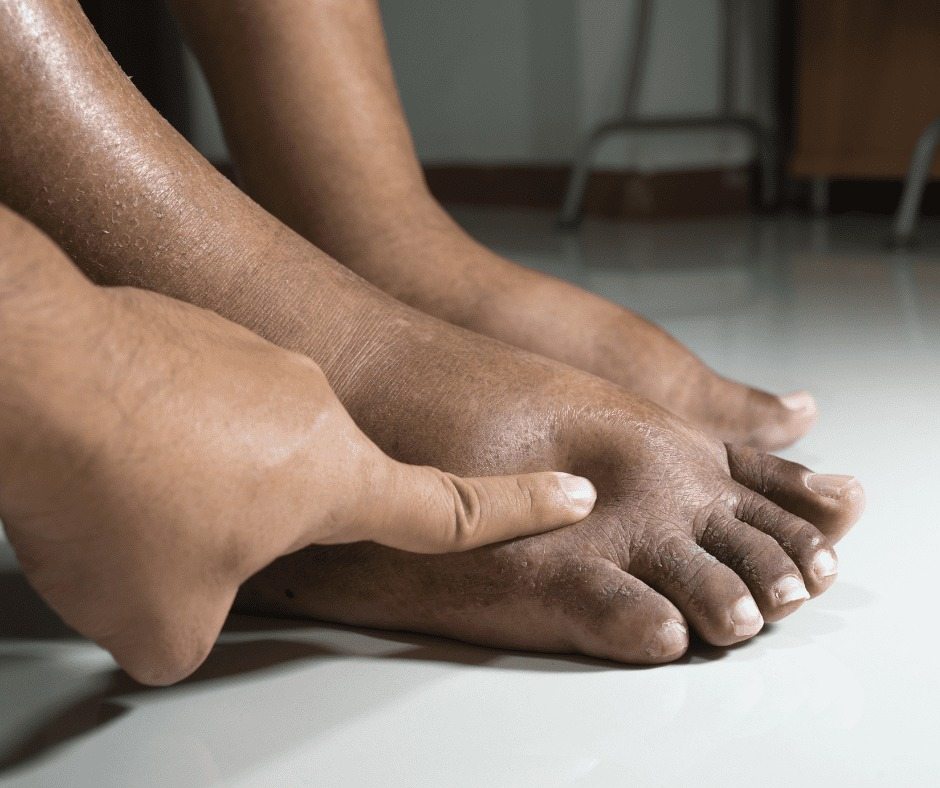Swollen feet make it hard to move. It can hurt, too. Some health conditions make it more likely.
Edema. This is when your body holds on to too much water. It can make your feet, hands, and face puffy. You might notice it after a long flight or if you stand for a long time. Some women have it around their period. It usually goes away on its own, but sometimes, it can be a sign of a health problem.
If you trip or take a wrong step, a swollen foot can signify a broken bone or a sprain. Your foot and ankle will swell as blood rushes to the area to help heal it. See your doctor if it hurts, you can’t put weight on it, or it looks wrong.
Pregnancy can cause feet to swell because the body holds on to more water. It can worsen at the end of the day or after standing for a long time. It’s not a problem for the mother or baby, but it can be uncomfortable.
Lymphedema is when your lymph nodes are damaged or removed, as often happens during cancer treatment. Your body removes less fluid, which can cause swelling in your arms, legs, and feet. It can also result from damage to lymph vessels or other lymph system problems. One treatment is called pneumatic compression. A sleeve is worn over the affected areas, and air is pumped in to help move fluid away. Exercise, massage, and compression sleeves or socks may help.
Chronic venous insufficiency
Your blood travels in veins with valves to return to your heart from your legs and feet. These valves can be damaged with age or from standing or sitting too long, and blood clots can also damage them. If your blood doesn’t return to your heart, it can collect in your legs and feet and cause swelling.
Heart failure is when your heart doesn’t pump blood properly. If your blood doesn’t flow well, it can back up in your legs and feet and cause swelling. Heart failure can make it uncomfortable to lie down; your heart may beat faster or in an unusual rhythm, and you might have trouble catching your breath. Call for help if you see these signs.
Your kidneys filter waste from your blood. If they don’t work right because of diabetes or high blood pressure, too much salt can be left in your blood. Your body holds on to more water, which goes down, swelling your feet and ankles.
Liver disease
If you have hepatitis or drink a lot, your liver has to work hard to fix itself. This can cause scar tissue to replace healthy tissue, and your liver can stop working. If this happens, your belly, legs, and feet can swell.
What to do:
Rice: rest, ice, compression, elevation. It helps with sprains and broken bones and can also help with swollen feet. Rest and elevate your feet to allow fluid to flow away from them. Ice narrows blood vessels and helps with pain. Tight socks or wraps can help push fluid away from your feet.
Move around
Walking every hour or so makes it harder for fluid to pool and keeps your blood moving. Moving your knees and ankles helps.
Medicine
Some drugs can cause your body to hold on to too much water, which can make your feet swell. Other drugs, called diuretics, can help with swelling. They make you pee more, which helps your body get rid of fluid. Talk to your doctor before changing or stopping your meds.
Call your doctor if your feet are swollen and you’re short of breath or have chest pain. These could be signs of fluid or a blood clot in your lungs. See your doctor if:
Your swollen foot leaves a mark when you press it.

 Discuss
More news
Discuss
More news


